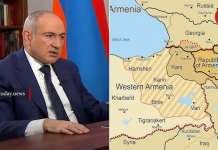Yerevan – On the December 6, Armenians are expected to vote in a referendum to amend the country’s constitution. A core part of the proposed amendments, is whether Armenia would shift from presidential system of government to a parliamentary one.
The amendments, which had been drafted by the Specialised Commission on Constitutional Reforms in late august, had been submitted to the Republican Party-dominated National Assembly for a vote, which passed with hundred and four in favour, ten against and three abstentions on the 5th of October. This vote was heavily criticised as being little more than rubber stamping, given the Republican Party’s holding of a parliamentary majority, with 70 seats out of 131. The Republican Party’s motion was also supported the Armenian Revolutionary Federation (Tashnagtsoutiun), which had long called for a parliamentary system, and had previously been a coalition partner with the Republicans until the 2009 Reconciliation Protocol vote, as well as the Prosperous Armenia Party (PAP), which despite initially campaigning against the reforms, was reined in after a controversial showdown between the President and the party’s former billionaire leader, Gagik Tsarukyan.
The major opponents the vote were the Armenian National Congress, headed by Armenia’s first president, levon Ter-Petrossian; first Foreign Minister, and onetime presidential hopeful Raffi Hovhannisian Heritage party, and the former governing partner-turned-opposition Rule of Law party.
Armenia adopted its first independent constitution in 1995, establishing the country as an independent, democratic and sovereign state, replacing the outdated 1978 soviet-era constitution. The constitution was further amended in 2005 to allow for dual citizenship for ethnic armenians abroad, as well as to further comply with Armenia’s commitments to the Council of Europe, including new provisions for human rights. Another major component of this amendment was to transform Armenia from a presidential republic to a semi-presidential system, with some presidential powers being transferred to the National Assembly.
These reforms proved controversial, with opponents claiming that the Kocharyan government at the time was not legitimate, and therefore, could not implement these changes. The voting process was also heavily criticised by international organisations citing large-scale voting irregularities.
The amendments were never-the-less commended by the Council of Europe’s Venice Commission, a constitutional body composed of independent experts, for strengthening Armenia’s democracy and human rights record.
While adopting a parliamentary form of government, the constitutional amendments would also abolish presidential elections, with future presidents being elected by parliament for 7 year terms. The position of President would no longer be Commander-In-Chief, with that role being passed on to the prime minister. Furthermore, the number of seats in the National Assembly would be reduced from 131 to 101. These proposed amendments are being made in tandem with increased regional self-governance.
The Republican-dominated Government argues that this new round of constitutional changes is necessary, since, as a democratising country, Armenia is rapidly maturing and correspondingly needs to update its constitution to keep pace Furthermore, transferring of power to parliament would help strengthen the country’s democratic traditions by turning this legislative chamber into a real decision-making body.
The government has likewise argued that decentralisation would also help strengthen democratic institutions across the country by allowing important decisions to take place on a local level.
These reforms are not without controversy, however, as a number of opposition groups, including the Liberal-leaning Heritage Party, the Armenian National Congress, and the extra-parliamentary opposition group, “Founding Parliament”, headed by lebanese-born former Fedayi, Jirayr Sefilian have vowed to oppose them. Sefilyan even went so far as to accuse the government of taking inspiration from the Communist Party, declaring that the President, “Serzh Sargsyan dreams of becoming Secretary of the Central Committee”. The president, however, has declared that he would not seek to remain in a political role once his final term as president ends.
They argue that the government does not enjoy the legitimacy required to make these changes, and that, far from facilitating the democratic process, they are designed to guarantee perpetual rule by the Republican Party of Armenia through a majoritarian process. ANC member Vahagn Khachatryan, was quoted as saying: “This [new] Constitution will not solve our problems, but further complicate them. This Constitution will be in the interests of neither the State nor the citizens.”
Critics of the opponents, however, argue that if the opposition doesn’t believe in the legitimacy of the electoral process, or the government’s democratic credentials, preserving the current constitution would be maintaining the status quo at best, or making it worse. If President Sargsyan were truly intending to stay in power through illegal means, they argue, the current constitution wouldn’t stop him. Others point out that a parliamentary system of government will allow a better organized and united opposition to have a louder voice in decision-making, and that such an opportunity should be capitalised on.
Other concerns with the first draft proposal include the possibility of a runoff election between the two largest factions in order to determine government portfolios, and the possibility of the right to marriage and freedom of spouses to be interpreted as a ban on non-traditional unions. These concerns were somewhat appeased in the second draft, which removed the requirement for runoff elections, while still allowing them.
The Venice Commission, which had previously helped the Armenian government draft the 2005 constitution, and has been advising Armenia’s Specialised Commission on Constitutional Reforms in the 2015 constitutional amendments had previously noted some discrepancies in the first draft, but was satisfied with the amendments in the second draft. concluding, despite a number of misgivings,: “Thanks to an open dialogue with the Venice Commission, important improvements have been made on a text which was already a very good basis for the constitutional reform.”
The commission did, however, note a number of minor concerns, such as the prohibition of forming new factions within parliament during parliamentary mandates.
Yerevan-based Human Rights lawyer, Gabriel Armas-Cardona, believes that from a strictly legal perspective, Armenia’s constitutional amendments “are acceptable, and maybe even respectable.” Despite the drafting process having been less than transparent, he believes that this didn’t significantly harm the actual result, as the government clearly took the advice of international experts into account. The specific issues which he sees in the new draft are more than made up for in the positive changes, which bring it more in line with other European constitutions.
Armas-Cardona cautions, however, that despite the quality of this new constitution, the real challenge lies in the way it is applied. “A constitution needs codes to implement it.” These new amendments will necessitate rewriting a great number of codes, including the electoral code. He predicts that in the event of a ‘Yes’ vote on December 6, the process of reform won’t be easy, and “A good end result will require constant oversight by the people and civil society”.
With the referendum date fast approaching, the ‘Yes’ and ‘No’ campaigns are in full swing, and already, opposition figures have accused the government of using state resources to sway the voting in its favour, citing inflated voter lists, but according to most figures, with only weeks to go, more than half the population is still undecided. The NO side has been fraught with obstacles, including a fractured campaign, and a lack of a clear message. They have been running two separate campaigns, with separate rallies set for December 1st and December 3d. The first being organized by the ANC, while the second being jointly promoted by Jirayr Sefilian group “Founding Parliament”, and Raffi Hovannisian (who has been noticeably missing from the events, as he is currently in the United States for personal reasons. This, amongst many other things, has been cited by critics as a clear sign that the NO campaign isn’t taking its role very seriously.
They have so far been unable to reach out to voters with more convincing arguments against the amendments beyond generic accusations of illegitimacy, and stoking fear that the government is intending to stay in power indefinitely. A social media campaign requesting that young people post photos of themselves holding signs saying “Ոչ” (‘no’ in Armenian) has also done little to spur discussion on the issue. The Yes side, meanwhile, has run an effective outreach campaign through social media, TV appearances and other methods.
For many, however, the real question isn’t whether or not the reform proposal will pass the referendum stage, but how these reforms will be codified into law.
Raffi Elliott
Yerevan Correspondent












